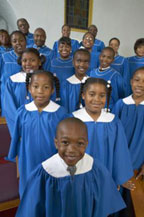 African-American Religions & Religious Beliefs
African-American Religions & Religious Beliefs
By Contributing Writer
For the majority of African-Americans, the church has traditionally played a significant role in the life of the community. This continues to hold true today: According to the Pew Research Center, more than half of all African-Americans attend church services weekly, compared with 39 percent of the total U.S. population. African-American religions and religious beliefs spring from this community’s history of oppression as well as its African roots.
History
Africans captured and brought to America were able to hold on to some of the religious practices common to their native land. The musical rhythms, drumming, dancing and call-and-response method of preaching come from Africa, as do the beliefs in spirit possession, healing and magic rituals, which are still practiced in some African-American churches.
In addition to African religions, the Christianity that was practiced in the South had a strong influence on the development of African-American religion. Slave owners often took slaves to services, but they had to sit in a separate section. Blacks met with discrimination at churches in the North as well, and they began to form their own churches.
Faith Groups
Christianity is the religion practiced by the great majority of African-Americans, according to the 2007 U.S. Religious Landscape Survey conducted by the Pew Research Center’s Forum on Religion and Public Life. Seventy-eight percent are Protestant, and a majority belongs to the traditional black churches, including the National Baptist Convention and the American Methodist Episcopal Church. Forty percent are Baptists. Other Protestant faiths represented include Pentecostals, evangelicals and non-denominational. Only a small number, 4 percent, of African-Americans belong to mainline Protestant churches, and only 5 percent are Catholic. Fewer than 5 percent of African-Americans claim any faith other than Christianity, and 12 percent are not affiliated with any religious group.
Beliefs
Among African-Americans, 88 percent firmly believe in God, 55 percent believe the Bible is the literal word of God, 83 percent believe in angels and demons, 58 percent believe in life after death and 84 percent believe in miracles. Even the most religious African-Americans are just as likely to describe themselves as politically moderate as politically conservative. Forty-nine percent of African-Americans believe abortion should be legal in most cases and 44 percent believe it should not be; 60 percent believe churches should express their political views, but 60 percent also believe churches should not tell their members how to vote.
Degree of Religiosity
As previously stated, African-Americans are more religious than the general population. In addition to higher church attendance, they are more likely to say religion is very important in their lives: 79 percent of African-Americans express this view, compared with 56 percent of all Americans. African-Americans are more likely to pray, with 76 percent claiming to pray daily, compared with 58 percent of all Americans. Even among African-Americans with no religious affiliation, 70 percent believe in God and almost half pray daily.
